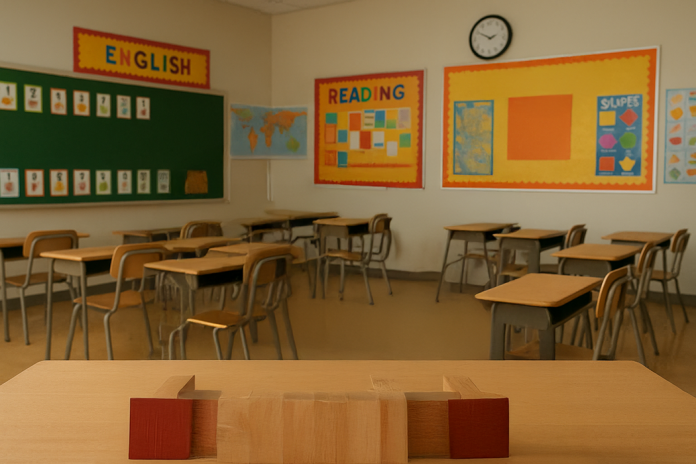June 10, 2025
___________
Allegra Seidler
After a saga spanning more than half a year (and with roots from over a year ago), at the June 6, 2025 Board meeting, East Brunswick Public Schools announced the planned pilot studies of Amplify CKLA and Being A Reader. In a Tap Into EB article, Dr. Joyce Boley, Assistant Superintendent of Academics is quoted saying, “We’re excited to collaborate with the State and the LEAR Office to ensure that all students, from the very beginning of their academic journey, have the tools and support they need to become confident, capable readers.” This comes mere months after administrators responded to parental concerns by presenting on the current ILA curriculum and Gifted and Talented services at the 2/13/25 school Board meeting. During these presentations, the current curriculum was touted as well-rounded and meeting students’ needs. And now, Dr. Boley thanks the community for its ‘partnership.’ But based on the district’s past actions, many families are left asking: What does partnership really mean in East Brunswick?
Community concern surfaced in November of 2024 when parents took to sharing testimony of their experiences with the current balanced literacy curriculum at EBPS Board meetings. All meetings are recorded and available to view here. These testimonies often addressed how various members of the administration denied and dismissed issues, and even delayed identifying reading disorders. They also addressed how teachers were instructed to respond to concerns about the ILA curriculum (including a written memo that went out in the Spring of 2024 telling teachers what to say if a parent dared ask about the ILA curriculum).
Prior to these public comments, I spent about a month corresponding with district administrators via emails that were forwarded to both Superintendent Valeski and the full Board before I ever spoke at a meeting. When I couldn’t obtain sufficient answers to multiple questions, including how much the district invested in the revised Units of Study in 2023, I decided to move this conversation into the public sphere. To my surprise, many parents came forward with disappointing stories of their frustrations with the ILA curriculum on all ends of the spectrum.
Between November 21, 2024, and now, our group of parents has spoken at nearly every Board meeting. Board testimony was sometimes anonymous, and sometimes shared by parents themselves. In addition, some parents did meet with administrators and continued to experience uphill battles, ultimately making very little headway. One parent, who is also an educator, was told her child did “not qualify for intervention at this time”, but chose to have him assessed outside of the district. This assessment revealed he required pull-out intervention. Somehow, this was not officially picked up within our school system, despite clear struggles. Without strong advocacy from this student’s parents and teachers (who knew the limitations of the current assessments and curriculum), there was not only no plan to intervene, but a complete denial of any need.
Another parent had voiced concerns beginning in kindergarten, when her child was “reading” memorized leveled books with her eyes closed, and again in first grade when spelling was not being taught in school. Another, also an educator and Certified Dyslexia Specialist, has been advocating for changes to the Tier 1 curriculum, literacy screenings, and intervention methods for at least four years. Despite these suggestions being part of an ongoing state initiative in partnership with East Brunswick neighbor, Rutgers University, she has encountered pushback every step of the way. Another parent was told by her child’s teacher that they could no longer answer her questions about this topic and that upper administration was handling it. These are not isolated incidents—they’re representative of a larger, systemic issue.
Part of what our group of parent-advocates worked towards was anonymously surveying teachers for their input on the elementary language arts curriculum. Why? They had already expressed concern about the curriculum, were upset that the district had purchased the revised Units of Study, felt their hands were tied when it came to getting kids the services they needed in a timely manner, and claimed administrators were fully bought into balanced literacy and not open to change.
At this time, no teachers are willing to go on record due to fears of retaliation, but the district did survey teachers. Despite several sharing with us how they had previously broached the topic of a need for a shift in pedagogy, administration has claimed to be caught off-guard by these public complaints and the results of the surveys. To our knowledge, and in spite of at least one Board member’s 2/13/25 request that the results be shared with the Board once obtained, no one outside of administration has seen the unedited responses. We do know only 35% of solicited teachers responded, and I would wager many of those who didn’t are non-tenured and/or likely not fans of the current setup. Maybe one day those results will be made public in their unedited form…
So, what exactly does “partnership” mean to East Brunswick Public Schools? I honestly couldn’t tell you. To all of these parents, the ones who met with administrators, the ones who were told nothing is wrong, the ones who continue to be told to accept less than best practice … the ones who know better … this announcement is the ultimate gaslighting. The district is “excited to collaborate with the State and LEAR Department”? This legislation was passed in June of 2024 and signed into law on August 13, 2024. That is before I broached this topic in an email or at a Board meeting. This legislation and the March 2025 recommendations of the Working Group are exactly what we have been advocating for—some of us for years. We are being told the selections are based on evaluations from EdReports and The Reading League, issues with EdReports withstanding – what was their review of the previous product, which the foundation of our curriculum was based on? Nothing good, and there’s a lot more where that came from. The revised Units of Study was updated to address weaknesses, but has yet to be officially evaluated, which was part of my questioning of why EBPS would choose to invest in this revised curriculum in the face of extensive data outlining the issues with the author’s previous work.
What we said not only meant nothing, but was pushed back on heavily. So much so that in November 2024, I received a response from Dr. Boley (reviewed by Dr. Valeski) that read:
“Media frequently features so-called experts who may have ties to specific companies, which can introduce bias into public discussions. In light of recent narratives that may misrepresent our approach, it’s crucial that we remain focused on supporting East Brunswick’s teachers as they help students grow in reading, writing, phonics, learning, and overall well-being.”
And:
“The criticism directed at Calkins, Fountas, and Pinnell has been heavily funded by organizations, corporations, and private equity groups that favor a limited selection of basal textbooks, which push all students to read the same texts simultaneously. East Brunswick has firsthand experience with a one-size-fits-all approach filled with workbooks and textbooks, turning language arts into a monotonous experience. This method does not allow teachers to facilitate the essential, assessment-based small groups that are crucial for students’ success.”
Some may be familiar with the “Southern Surge” or “the Mississippi Miracle,” and maybe even the separation of Lucy Calkins from Columbia Teachers College. The district’s focus on media narratives is predicated on the ongoing international campaigns to remove balanced literacy, including the podcast, Sold A Story. This media-bias claim proved to be an ironic point, as many of the sources supplied in this response were either Lucy Calkins (the author of Units of Study) or Heinemann (the Units of Study publisher) – all extremely neutral parties.
On multiple occasions, EBPS administration not only chose to ignore, but to deny the existence of any problem(s) and the impending state requirements. Not using a universal screener, such as DIBELS, and not automatically informing parents of results is a choice the district made. There is no reason we needed to wait until September 2025 to do this. DIBELS is not new, and a version can be accessed for free, meaning if the district wanted to, they could easily screen beyond third grade (it can be used through 8th grade). Parents need to be aware that these changes are being made only because the district’s hand was forced. If this were a true partnership, these changes would have occurred organically because of internal identification of need (e.g., the low percentage of students being adequately served by Tier 1 curriculum), because of parental concerns, because of teacher feedback, and not because of state legislation, recommendations, and public outcry. Nothing in these recommendations is new, nor was it new when the district purchased the revised Units of Study.
Before this moment, shutting parents down in private meetings was the primary response. That is unacceptable. Parents deserve a visible, meaningful seat at the table. We want to be involved in committees, such as a Curriculum Committee. We want to be able to transparently partner with the amazing educators of EBPS without their employment being put at risk, and without having to wonder if we’re getting the full story. We want best practices accessible to all children, not only the ones whose parents can scream the loudest or pay for tutoring. Our children are the
ultimate stakeholders here; their time is valuable, their education is important, and they have only us to represent their interests.
How will an administration that so fervently defended the current curriculum be capable of committing to perform a robust pilot study and reverse course on its ideological commitment to the pedagogy of balanced literacy, especially in such a short time? Are you okay leaving this to chance? I’m not, which is why I am continuing to advocate for reform and accountability in our district.
We need a clear policy guiding the requirements for and structure of pilot studies. A policy that requires meaningful incorporation of stakeholders, including parents and teachers. A policy that requires publicly debriefing the Board. A policy that requires disclosure and parental consent for participation. A policy that requires assessment metrics. A policy that incorporates how educators are selected to participate. We need a Board that completely understands its position is designed to represent the interests of the public and not the administration. I have asked the Board for this, and I am urging you to do the same. This cannot happen again. Not with language arts, not with math, not at all.
East Brunswick Public Schools has done everything they could to avoid addressing this, and referring to this move as embracing recommendations or partnering with parents is categorically false, at best. Every single parent in this district needs to know what they are up against: A culture of deny, dismiss, and delay for as long as possible, at the expense of your children. They have no time to spare, and this is why we remain concerned.
For more information, please visit:




